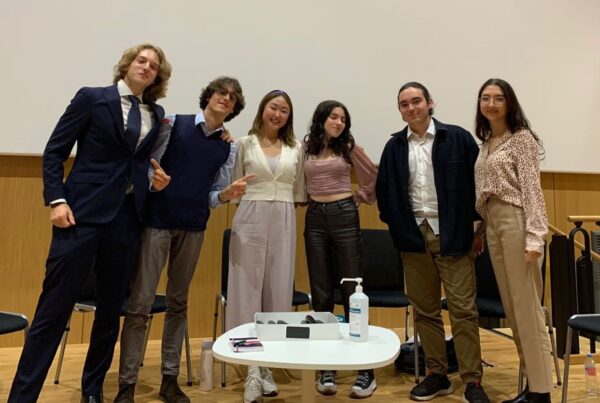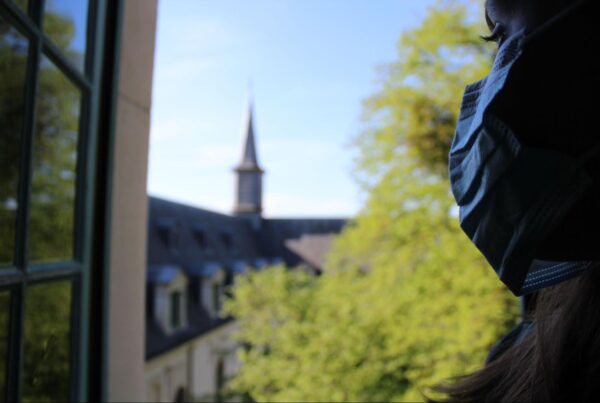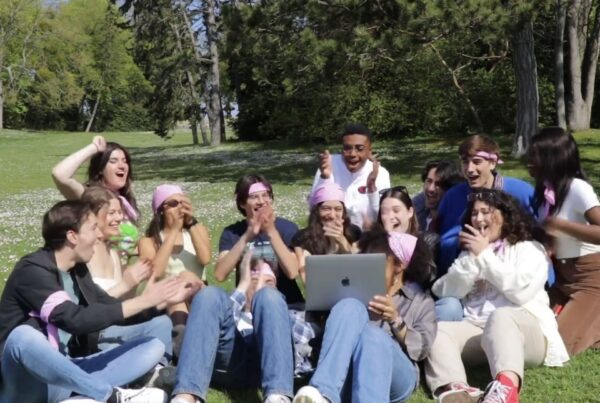By Cassandra Betts
What is the link between philosophy and climate change? How does one approach the climate change issue from a perspective other than the scientific one? Where does optimism fit into the picture? What can individual students do when faced with climate change? Kellan Anfinson sat down with the Sundial to explore all these questions and more. The teacher of multiple political theory courses at Sciences Po, Anfinson also teaches a course entitled “The Politics of Climate Change: Representations and Responses.” One of the most sought after courses during IPs, this class approaches climate change from sides beyond the traditional ones, exploring the links between climate change, Christianity, the economy, denial, and violence (to name a few.)
Anfinson, who is trained in political philosophy but has always been interested in environmentalism, started to dive into the issue more deeply for his dissertation, and was inspired by Kierkegaard’s theory of how one comes to believe in God. He asked himself the question: “What would it mean to believe in climate change the way that Kierkegaard believes in God?” From there, he took different concepts from different philosophers, including Nietzsche, and used these concepts to approach the momentous issue of climate change. “I got the idea to see what a class would look like where we try and just see it from a bunch of different sides, and see if some of those speak to us more and if some of those speak to us less. [We can see] where our own personal tipping points are, where we move from knowing about the issue to caring about the issue, or from knowing about the issue to finding our selves involved with the issue.”
Sundial: Talking about getting involved with the issue, it’s a really big issue and kind of daunting, do you think that individual actions do make a difference?
Anfinson: Yeah, definitely. Everything makes a difference. There’s always the question of scale and “a difference to what” but if it makes a difference to you to do one thing rather than another then you’ve already made some kind of difference. Sometimes I’ll talk to people and they’ll be like “well, I’ve become vegetarian or I’ve become vegan for environmental reasons and it produces these very difficult conversations with my family and even bigger problems when I visit my family, especially around the holidays.” I have friends who had to start cooking for themselves when they were twelve years old because their parents refused to accommodate their chosen eating style. And then when something that is a very minor issue in this way (for example saying I don’t want to have whatever cheese or some kind of dairy added to my vegetables) becomes a huge conflict, then you can see that it matters. Even if it doesn’t produce a change, even if it doesn’t convert your whole family, it makes them confront the issue. And when people get angry about it they deny it. And then that can extend all the way up.
You can have really momentous individual actions, like participating in protests, whether it be a march or, as people [including climate scientists] have been doing more in the United States, chaining themselves to the fence outside the White House. [This means that] there are very respected figures wearing suits who the police have to carry away. I think this matters even more. It puts more energy behind [your actions] and then you might decide not to fly. That seems like a very small thing that only you do, but every flight that you take, I forget exactly what the statistic is, but for example the flight from New York to London, if you just do that once [the emissions are equivalent to those of] the average driver in the UK who has a car. Just a one way flight takes a car off the road.
I think that everything is interconnected, and [actions] do build up. You get a level of resonance between personal action, community action, political action, and global change. An optimist would say ‘maybe all these things are starting to resonate together eventually and we will get some kind of meaningful global response in maybe the next ten years.’
Sundial: Optimism is a big question, it’s something that you’ve covered in your class, how optimistic do you think you are personally?
Anfinson: I’m an optimist in a dark way maybe? We all enjoy the world to various degrees. One of the questions at the heart of dealing with climate change is: could you still enjoy a world and love a world which was none the less capable, as this one seems to be, of catastrophic climate change that has the potential to plunge very large portions of the population into quite high degrees of suffering? Is that a world that you could find a home in for yourself, a spiritual home or an emotional home? I think if you can say yes to that question, if you can affirm that, then that’s not necessarily the most optimistic thing but it is …I would prefer to substitute the word ‘optimism’ with affirmation. Can you affirm various circumstances, even if you don’t want to predestine thing or believe that things will be good, especially when you want to be able to tell the truth about things that are not very nice to talk about and that sound very un-optimistic? There’s the argument that optimism gets in the way, that the desire to make things sound good, sound manageable, gets in the way of the ability to tell the truth about those things.
Sundial: Climate change is often associated with the hard sciences. What do you think is the role of other studies, like philosophy in the future of climate change?
Anfinson: You have one scientific view that will still insist that the data is there, that we just have to come to terms with the data and act on the data. But it doesn’t seem like that’s the way humans are, particularly in this instance. There are other scientists who are coming to terms with this. Maybe they’re not engaging in philosophy, but they’re saying that we need to engage in politics, we need to break down this idea that there has to be a strong division between objective science and political engagement.
If one of the key things that philosophy is trying to do is help us think about the meaning of our place in the world, then this is an immense time for philosophy. I think everyone is in some way a philosopher. Everyone likes to tell you how they see the world. When we start talking about things like the anthropocene, which might have a clear scientific definition that places it in a clear scientific category, using science we can say “we will be able to tell by the geological records that this is a new phase in the history of the earth.” That limits it in one way, because the whole label of the anthropocene opens up a philosophical question about what the role of humans on the earth is, what the meaning of human activity is, what the limits of humans are. I think it opens a lot of questions. I’m not saying that it’s the role of philosophy to answer them, but it’s useful to think about them philosophically and to explore them, and then maybe we can come back to the politics and the science with a little bit of a broader imagination and a new way of seeing things that will also give the type of activities that we have to engage in meaning. A lot of people writing about it will say “it seems like we’re going to have to consume a lot less, and own a lot less things, buy a lot less things, travel a lot less. A lot of people see that directly as a loss of meaning in life, a loss of value in life, and some may even say a life not worth living, but I don’t think that’s true. I think philosophy can help you give meaning to that. Also, if you’re in the camp of people who, when you think about environmental destruction and climate change you think it’s really just a technological problem. [Some people think] we just need time, and then we’ll have sufficient technology to engineer our way out of it, take carbon out of the atmosphere, build new habitable cities. [But] that technology doesn’t exist yet. It’s an issue of faith or an issue of philosophy. [Some people] see humans as fundamentally these rational beings without limits, who can achieve anything. I don’t deny that it’s a very nice picture, it’s pleasing in a lot of ways, but that’s fundamentally not an empirical observation, it’s a philosophical observation when you start putting your faith in a vision of humanity like that. Everyone’s tied up in philosophy, even if they’re not actively doing it.
Sundial: You brought up the point that a loss of consumption being equated to a loss of meaning, but there are groups of people who have never enjoyed this consumption. What do you think climate change means for the people who are not the consumers?
Anfinson: Well I’d say it doesn’t look good. If we think that the political situation in Syria has produced a lot of refugees, that’s nothing compared to the number of refugees that climate change is going to produce. It’s kind of fascinating and surprising when you think that when some people imagine not being able to consume in the way they want to consume, they see that as a life not worth living, when at the same time there are people who have to leave all their possessions and their homelands and their family behind and journey into unknown places where they don’t speak the language, aren’t familiar with the institutions, aren’t familiar with the ecology and geography of the landscape, and the seasons. And yet they still find it worthwhile being alive, and worthwhile fighting for. And I think it is very interesting to see that contrast, and it can maybe serve as a bit of a reality check for people whose first intuition is that they can’t imagine being deprived of their consumption habits. They might be able to abstract from their own position for a second and come back and see that it’s not really so bad if I don’t have access to giant box stores filled with goods.
Sundial: What advice do you have to people who want to get involved, want to learn more about this issue but just don’t know where to start, because it seems so big and hopeless at times.
Anfinson: This is another place where small individual actions can be good. If people feel a lack of confidence and they feel ineffectual, even a small change can bolster their confidence a bit. I think every student when they get a nice grade on a paper (especially if it was higher than they were expecting) feels a nice surprise at their own efficacy and their own ability. Even if there are still problems, and even if there are still critical comments, they’re still feeling good about it. And that’s just a tiny thing. It’s one assignment that you wrote for one class in one year of your studies that you probably won’t look at again. [Climate change is] certainly something that can consume a lot of your time and energy if you want to give it to it, but it’s also enough to be a vigilant reader of the news. You can’t just read the front page because the environmental news gets slated to the bottom of the webpage, or to a separate section if you actually have a physical newspaper. Check those things out. Don’t just follow what’s happening with the next round of negotiations and agreements, try and follow the science sections as well. You don’t have to understand all of the science but we have very skilled science writers out there who are trying to translate the new things that science is seeing with climate change into a new language that is available for broader consumption. As you’re hearing something that might be a bit disturbing it’s also fascinating and empowering as well. You do really have a new knowledge about the world at that moment, and that’s a new knowledge that can inform the conversations you have with other people, the way you vote to the way you behave, the way you consume, whatever. You could give a lot, but you could also just start by looking at, first, the way you live your life, and second, how you read the news, which I think are very small entry points and very manageable for even a very busy student.
Other posts that may interest you:
- The Trouble with ‘Ecocide’
- Carbon dioxide removal – hit or miss?
- Local Victories for Turkish Opposition — A Sign of Hope?
- Are France and Japan a Mismatch Made in Heaven?
- A Reflection on Dark Tourism
Discover more from The Sundial Press
Subscribe to get the latest posts sent to your email.



